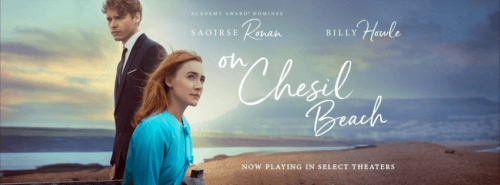On Chesil Beach (2018) Flash Review
On Chesil Beach (2018)
Director: Dominic Cooke
Screenwriter: Ian McEwan
Starring: Saoirse Ronan, Billy Howle, Emily Watson, Anne-Marie Duff
Telling the tale of a young couple from the early 60s who encounter problems in the bedroom when it comes time to consummate their marriage, On Chesil Beach is a melancholy cautionary tale of love and sex that points fingers at the dangerous methods of middle-England’s history of behind closed doors prejudices and hypocritical standards that is told mostly through flashbacks in a moving albeit sometimes messy narrative that seemed almost cliche in parts yet gave birth to two moving and evolved performances from Saoirse Ronan (Lady Bird) and Billy Howle (Dunkirk) that each compliment the work of a director who handled the gravity of the original material with a poise befitting of a man more experienced than one making his feature directorial debut.
What is most pressingly praiseworthy in On Chesil Beach is the reserved pair of performances leading the film, as for vast periods the duo build their characters around almost frustratingly intrinsic anxieties and pains that only manifest in their most fateful encounter. The way Ronan and Howle are encouraged to work with an almost stage-like dialogue more akin to the age of Classic Hollywood than your typical British fare works wonderfully to illustrate so much of the classist, religious and cultural undertones of the story and is certainly the greatest achievement of their respective performances, as in other hands the dialogue could have been seen to be too metaphorical or absent from the truth to be so easily believed as a means through which two people would actually communicate.
The true strength of On Chesil Beach comes in its delivery of its final act which, after the movie has been treading water around the real issues at the heart of the two characters’ relationship, comes to the fore in a flurry of images and moments which encapsulate all that was broken and to be broken between the two via metaphors centred in the evolution of society, and more importantly reminiscent of the greater impact of the relationships we each experience and come to think differently of as time passes by. In many respects, the choppy and sometimes messy style through which the story is told (flashbacks, dreams, flashbacks within flashbacks etc.) operates to maintain a level of intrigue and investment in the picture that makes this final act worth the wait – without this creative choice, the rest of the film could have seemed a little too slow and potentially even boring.
Visually, On Chesil Beach cinematographer Sean Bobbitt (12 Years A Slave, Hunger) accomplishes a sophisticated visual art piece that is profoundly beautiful – and vitally interweaved with the Britishness of the countryside and the coast – yet rarely removed from its intention to tell a deeply personal story. Similarly, the original score the movie works to highlight so much of the drama ongoing in the piece and even acts as a connection through time for the narrative, though this is almost frustratingly punctuated by invasive pop songs that work to illustrate the coming social revolution of the 60s but not so much so that they escape the feeling of being included as the result of a boardroom meeting that looked to make the movie just that little bit more marketable.
On Chesil Beach is, then, a movie that is not without its problems, but a British release that is worth celebrating nonetheless. It is a film that offers a unique and often beautiful visual portrayal of more typical aspects of British life, while the lead performances grow to be close to outstanding as the somewhat laborious dialogue through which the central duo’s journeys are told comes into its own. This is a film that is hardly going to turn heads and win at all of the major awards shows, but is a solid directorial debut for Dominic Cooke that achieved more than what might be expected of a romantic drama of its type and cleverly steered clear of falling into several cliche traps along the way.
16/24
[DISPLAY_ULTIMATE_SOCIAL_ICONS]


